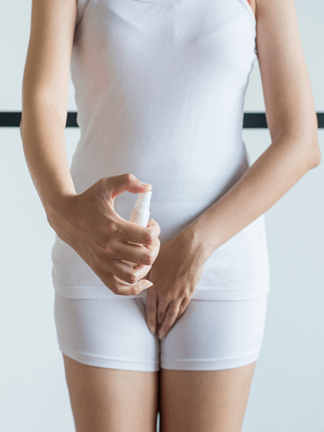Have you ever stopped to take notice of your vagina’s smell, or how it can change from day to day? How your vagina smells could be a sign of what’s going on down there and indicate that there’s a problem. The vagina is home to billions of bacteria, but this bacteria can change on a daily basis. It is these small bacterial changes that could have an effect on your vagina’s odour.
We’ve looked at some common vaginal smells and the reasons for each one.
Why does my vagina smell...
...coppery or metallic
A slight coppery or metallic smell is nothing to worry about. You may notice that this smell becomes more prominent just before your period or just after it. This smell should go away. If it doesn’t, it could be a sign of vaginal bleeding, particularly if the metallic smell is accompanied by itching or discharge. If you’re experiencing these symptoms, you should book an appointment to see your doctor.
The other reason your vagina may have a coppery smell is semen. If your vagina has come into contact with semen recently, this can change its pH balance, therefore making it smell different to normal.
...like body odour
Your vagina could smell simply because of poor hygiene. Just like your armpits, your crotch area contains apocrine glands that allow you to sweat. Sweating in this area is quite normal and helps your body to regulate its temperature, just like you might sweat from your armpits. However, this sweating can begin to make the intimate area smell unclean, particularly if you don’t shower regularly. When you have a shower, you should use a feminine wash that doesn’t contain any soaps or colourants. This will gently clean the area and should help with the smell. To prevent excess sweating, you should wear light-fitting cotton underwear that allows your skin to breathe.
...sour
If your vagina has a slight sour smell, this is a sign of a healthy vagina. Some people compare it to the smell of fermented foods such as yoghurt and sourdough bread. That’s because these food products contain lactobacillus - the same type of good bacteria that is present in your vagina. This good bacteria is there to fight off the bad bacteria and prevent infections. This smell is nothing to worry about.
...like chemicals
A strong ammonia-like smell can be caused by a build-up of urine in your underwear. You should ensure that you wipe properly after going for a wee to ensure the area is clean. Urine that has a strong ammonia smell could also be a sign of dehydration, so remember to drink plenty of water to keep your body hydrated.
Some women report an ammonia smell early in pregnancy. There is no evidence as to why this happens, but it could be due to another pH change in the vagina. It could also be a sign of bacterial vaginosis (BV).
Bacterial Vaginosis (BV)
Why does my vagina smell of fish?
The most common cause of a fishy vagina is Bacterial Vaginosis (BV). BV is a bacterial infection that is caused by an imbalance of bacteria in the vagina. Symptoms of BV can include:
● A strong fishy odour
● Thin discharge that’s an off-white or grey colour
● Itchiness
● Burning, particularly when you wee
If you think you might have BV, you should book an appointment with your doctor.
The other cause of fishy smelling discharge is trichomoniasis. It’s one of the most common sexually transmitted infections (STIs) that is caused by a tiny parasite. Symptoms will normally develop within a month of contracting the infection. It may be treated with antibiotics. Consult your doctor for advice on a suitable course of treatment.
